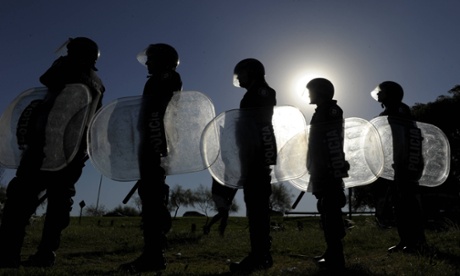Welcome to DU!
The truly grassroots left-of-center political community where regular people, not algorithms, drive the discussions and set the standards.
Join the community:
Create a free account
Support DU (and get rid of ads!):
Become a Star Member
Latest Breaking News
General Discussion
The DU Lounge
All Forums
Issue Forums
Culture Forums
Alliance Forums
Region Forums
Support Forums
Help & Search
General Discussion
Related: Editorials & Other Articles, Issue Forums, Alliance Forums, Region ForumsWhy food riots are likely to become the new normal
http://www.guardian.co.uk/environment/blog/2013/mar/06/food-riots-new-normalThe link between intensifying inequality, debt, climate change, fossil fuel dependency and the global food crisis is undeniable

Riot police guard a supermarket attacked by food rioters in San Fernando, Buenos Aires. Photograph: Juan Mabromata/AFP/Getty Images
Just over two years since Egypt's dictator President Hosni Mubarak resigned , little has changed. Cairo's infamous Tahrir Square has remained a continual site of clashes between demonstrators and security forces, despite a newly elected president. It's the same story in Tunisia, and Libya where protests and civil unrest have persisted under now ostensibly democratic governments.
The problem is that the political changes brought about by the Arab spring were largely cosmetic. Scratch beneath the surface, and one finds the same deadly combination of environmental, energy and economic crises.
We now know that the fundamental triggers for the Arab spring were unprecedented food price rises. The first sign things were unravelling hit in 2008, when a global rice shortage coincided with dramatic increases in staple food prices, triggering food riots across the middle east, north Africa and south Asia. A month before the fall of the Egyptian and Tunisian regimes, the UN's Food and Agriculture Organisation (FAO) reported record high food prices for dairy, meat, sugar and cereals.
Since 2008, global food prices have been consistently higher than in preceding decades, despite wild fluctuations. This year, even with prices stabilising, the food price index remains at 210 – which some experts believe is the threshold beyond which civil unrest becomes probable. The FAO warns that 2013 could see prices increase later owing to tight grain stocks from last year's adverse crop weather.
InfoView thread info, including edit history
TrashPut this thread in your Trash Can (My DU » Trash Can)
BookmarkAdd this thread to your Bookmarks (My DU » Bookmarks)
4 replies, 1014 views
ShareGet links to this post and/or share on social media
AlertAlert this post for a rule violation
PowersThere are no powers you can use on this post
EditCannot edit other people's posts
ReplyReply to this post
EditCannot edit other people's posts
Rec (7)
ReplyReply to this post
4 replies
 = new reply since forum marked as read
Highlight:
NoneDon't highlight anything
5 newestHighlight 5 most recent replies
= new reply since forum marked as read
Highlight:
NoneDon't highlight anything
5 newestHighlight 5 most recent replies
Why food riots are likely to become the new normal (Original Post)
xchrom
Mar 2013
OP
lpbk2713
(42,759 posts)1. The availability of potable water is becoming a concern as well.
It's bad enough now for deprived societies but it will be a nightmare for future generations.
MrScorpio
(73,631 posts)2. Soylent Green, here we come. nt
OldDem2012
(3,526 posts)3. Too many people (and growing) and too few resources getting to where they're needed the most. nt.